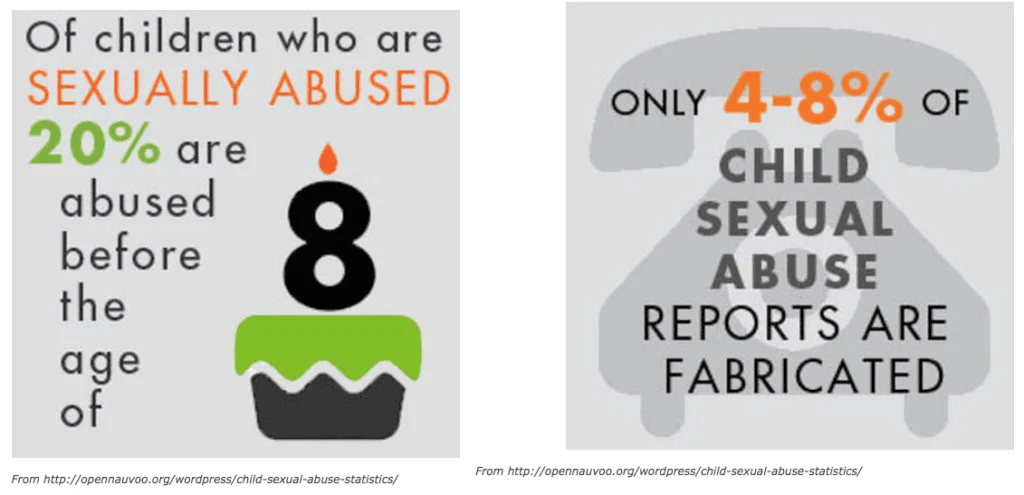Let me educate you with some facts about childhood sexual abuse:
About 1 in 10 children are sexually abused before they turn the age of 18. (*1)
About 90% of children who are victims of sexual abuse know their abuser. (*2)
About 60% of children who are sexually abused are abused by someone the family trusts. (3*)
Most sexual abuse of children happens in a residence, typically that of the victim or perpetrator. (4*)

These facts are terrifying, yes. Especially when you put them into perspective so they really sink in (for example: think of your kid’s school class. There’s what, 25-30 kids in there? One child in ten are abused before they turn 18.) But every single parent needs to pull their head out of the sand and acknowledge that these facts exist because these circumstances can happen. Even if you think it could never happen to your kids, it can, especially if you have not learned what to watch for.
I’m an example of this. I grew up in a beautiful home, surrounded by love and comfort. I’m the youngest of nine kids and I was lucky enough to have both parents in the home who had/have a strong marriage. My mom chose to leave career opportunities after she graduated college to raise us and run her home.
We have always been good, Christian church going people and my parents often opened our home and our services to others in need. You wouldn’t look at us and suspect that a close family friend of my brother’s was sexually abusing me behind closed doors. Despite all the love and care, bad things can still happen if you aren’t proactive.
Because of my abuse, I feel a unique opportunity to help other parents protect their children. I have learned, through personal experiences, classes, and therapy, how to protect my children from sexual abuse and I would like to pass on some important tips:
Learn the facts and acknowledge the presence of evil in the world, but don’t let it scare you into never leaving your house. We live in a great age of enlightenment due to the internet. You have so much information at your fingertips. Learn the statistics, learn the warning signs, and parent accordingly. It’s easy to get terrified when going down this rabbit hole. Just remember: the more you learn, the more prepared you already are and the better chances your child already has to stay protected.
Teach your children about their bodies, using CORRECT anatomical language. There is nothing dirty or bad about the words “penis” and “vulva.” There’s a difference between bad words and private words. Make sure your child knows there is no shame or punishment in talking to you about their privates, like their penis or vulva. Children should also know the correct terms for their body parts in case something does happen and they have to speak with police officers later on, or testify in court. Prepare for the worst-case scenario and you’ll likely never even get close to it actually happening.
Talk to your children more than once or twice. Start talking to your children about their bodies while they are still young. Age appropriate conversations as they continue to grow will help them remember the important protection you’re trying to teach them. By doing this, they are more likely to speak up if someone invades those private spaces and will feel comfortable talking to you, if needed. If you need ideas of how to begin these conversations, Defend Innocence gives great information for each age and has other valuable resources regarding childhood sexual abuse.
Teach your children about consent. “No” is not a bad word. “No” can be said to adults if needed, especially if they feel threatened or scared. When I was being abused by an older adolescent, he convinced me that I would get in trouble if I told. He groomed me to believe that since he was older, he knew better. And inadvertently, my parents had raised me to trust and respect everyone older than myself, not realizing that I would innocently understand that to mean I couldn’t say “no” to anyone, no matter how uncomfortable I was. Today, I let my kids say no to hugs, even to their beloved aunts and uncles. Today, I teach my kids that they are allowed to have control over their own bodies.
These tips are just the beginning, but they’re a good place to start for every parent. Open the dialog with your child and keep that trust open and available. Teach them the best you can and then have confidence in them to make their own smart choices when you can’t be physically there. And if you research the warning signs and suspect your child may be getting sexually abused, follow your parental instincts and reach out to someone who can help.
I’ll leave you with one last fact about childhood sexual abuse: With help and support, abused children can return to healthy living and can recover from the trauma.
(And if you are a fellow survivor of childhood sexual abuse who, like me, are now an adult who has not dealt with that trauma yet, I highly recommend checking out The Younique Foundation and their resources. You can also reach out to me directly via my email at [email protected] if you need a confidant.)
Sources:
- Townsend, C., & Rheingold, A.A., (2013). Estimating a child sexual abuse prevalence rate for practitioners: studies. Charleston, S.C., Darkness to Light. Retrieved from www.D2L.org.
- Whealin, J. (2007-05-22). “Child Sexual Abuse”. National Center for Post Traumatic Stress Disorder, US Department of Veterans Affairs.
- Finkelhor, D. (2012). Characteristics of crimes against juveniles. Durham, NH: Crimes against Children Research Center
- Snyder, H. N. (2000). Sexual assault of young children as reported to law enforcement: Victim, incident, and offender characteristics. Washington, DC: U.S. Department of Justice, Office of Justice Programs, Bureau of Justice Statistics. Retrieved January 12, 2009 fromhttp://www.ojp.usdoj.gov/bjs/pub/pdf/saycrle.pdf
